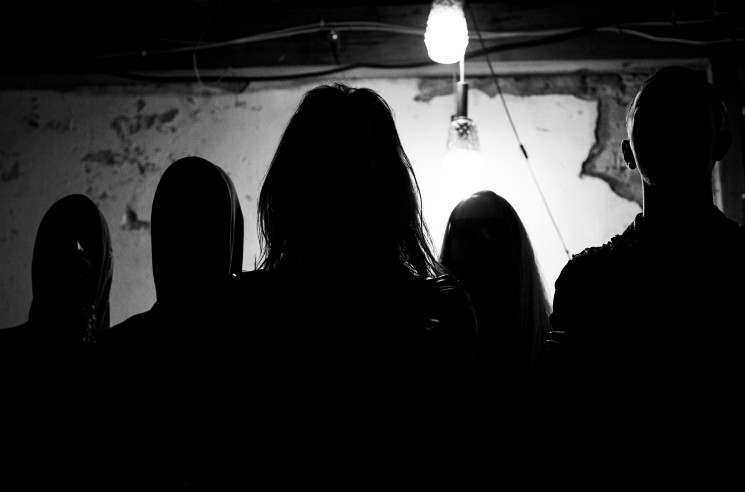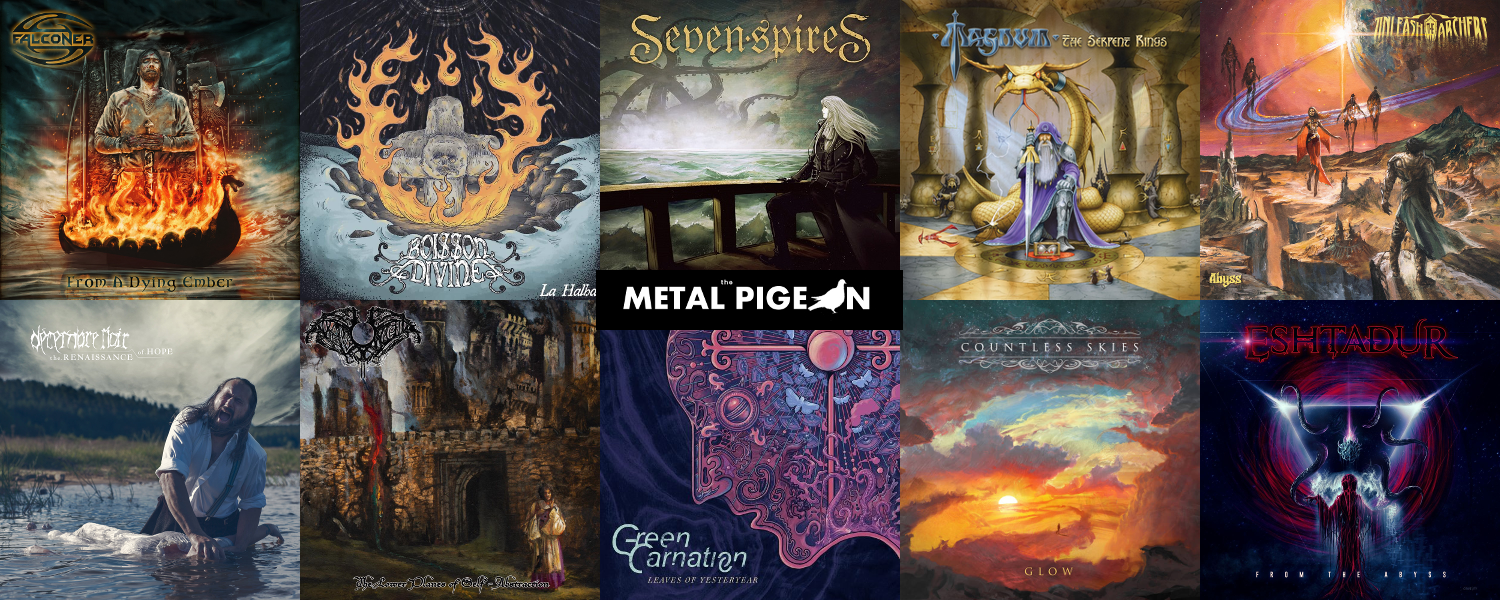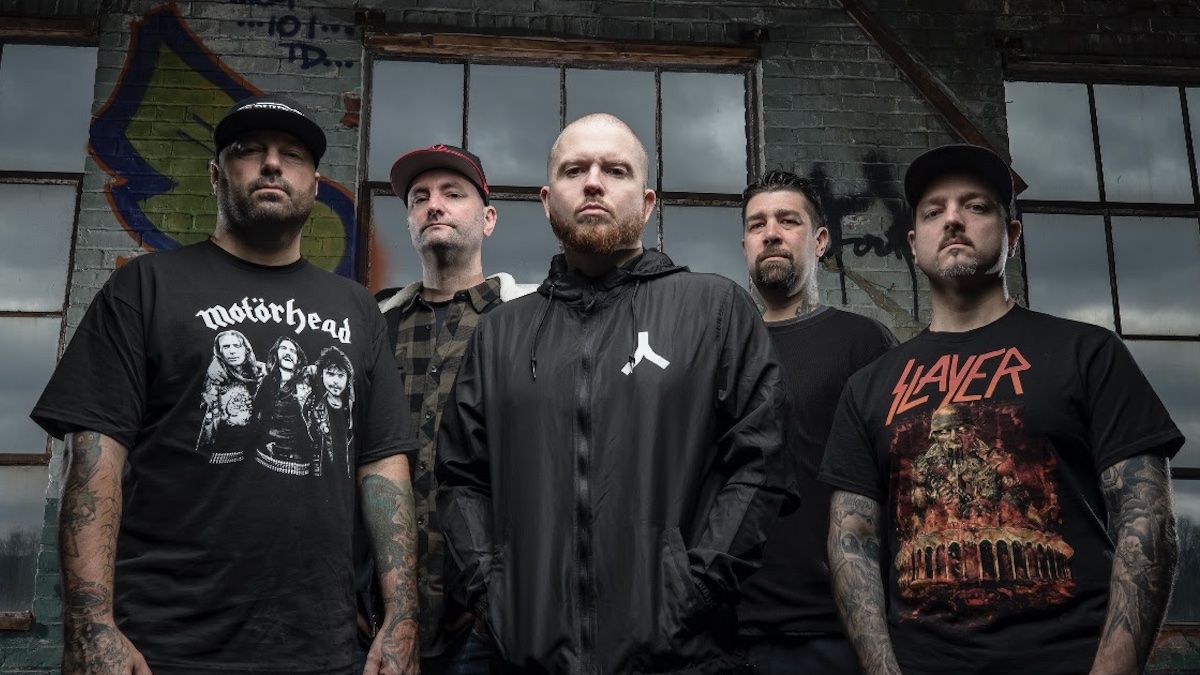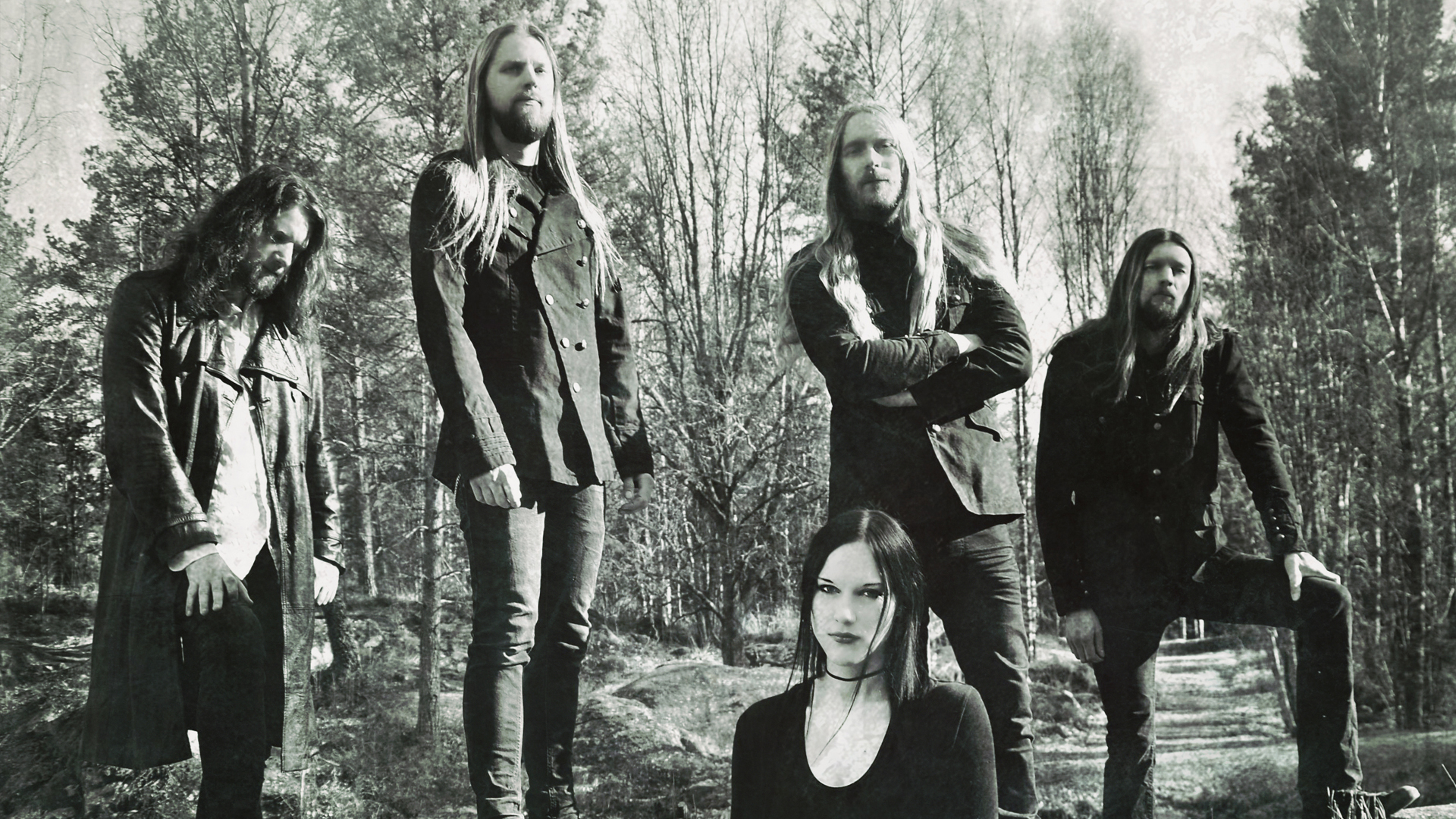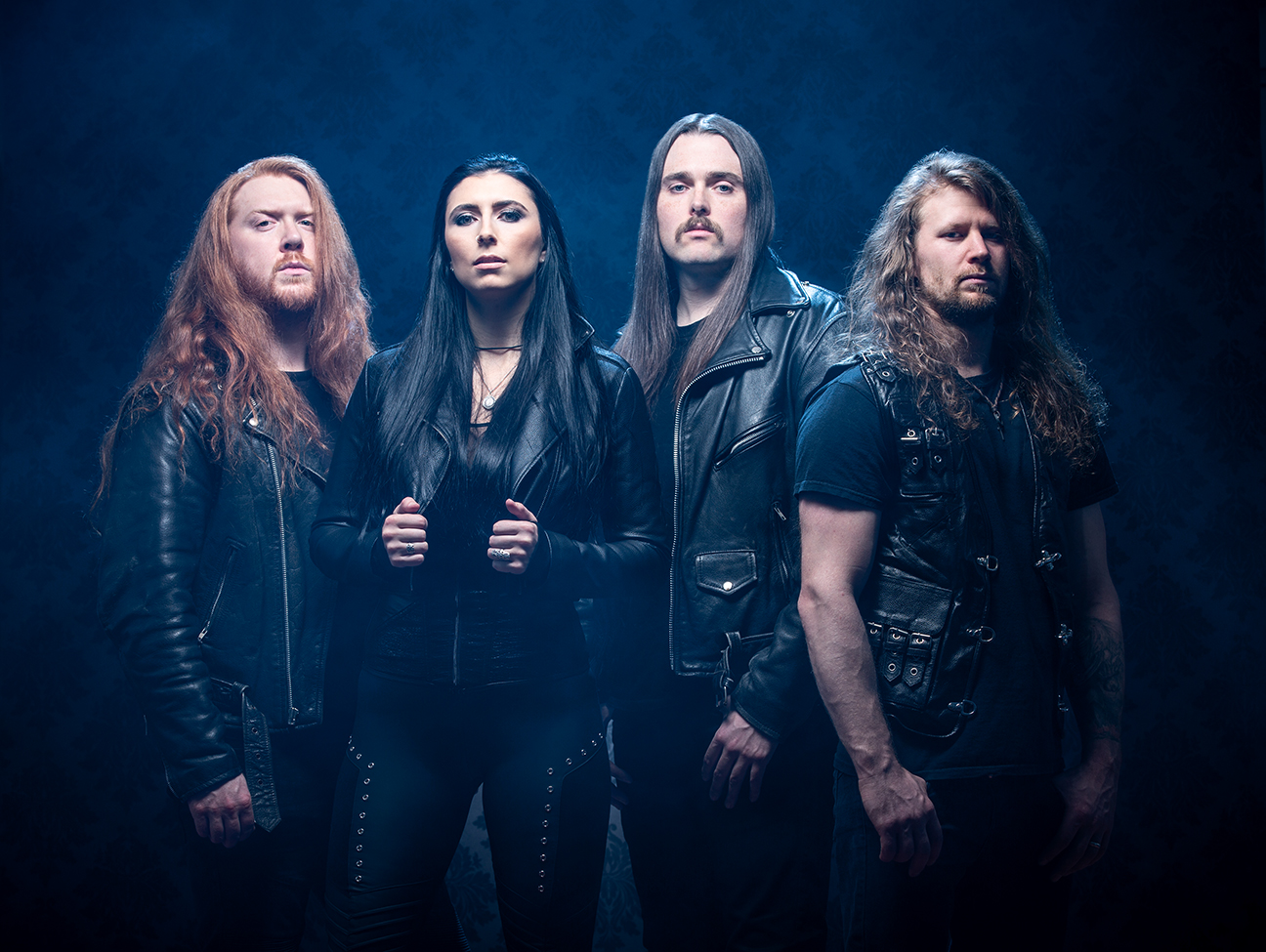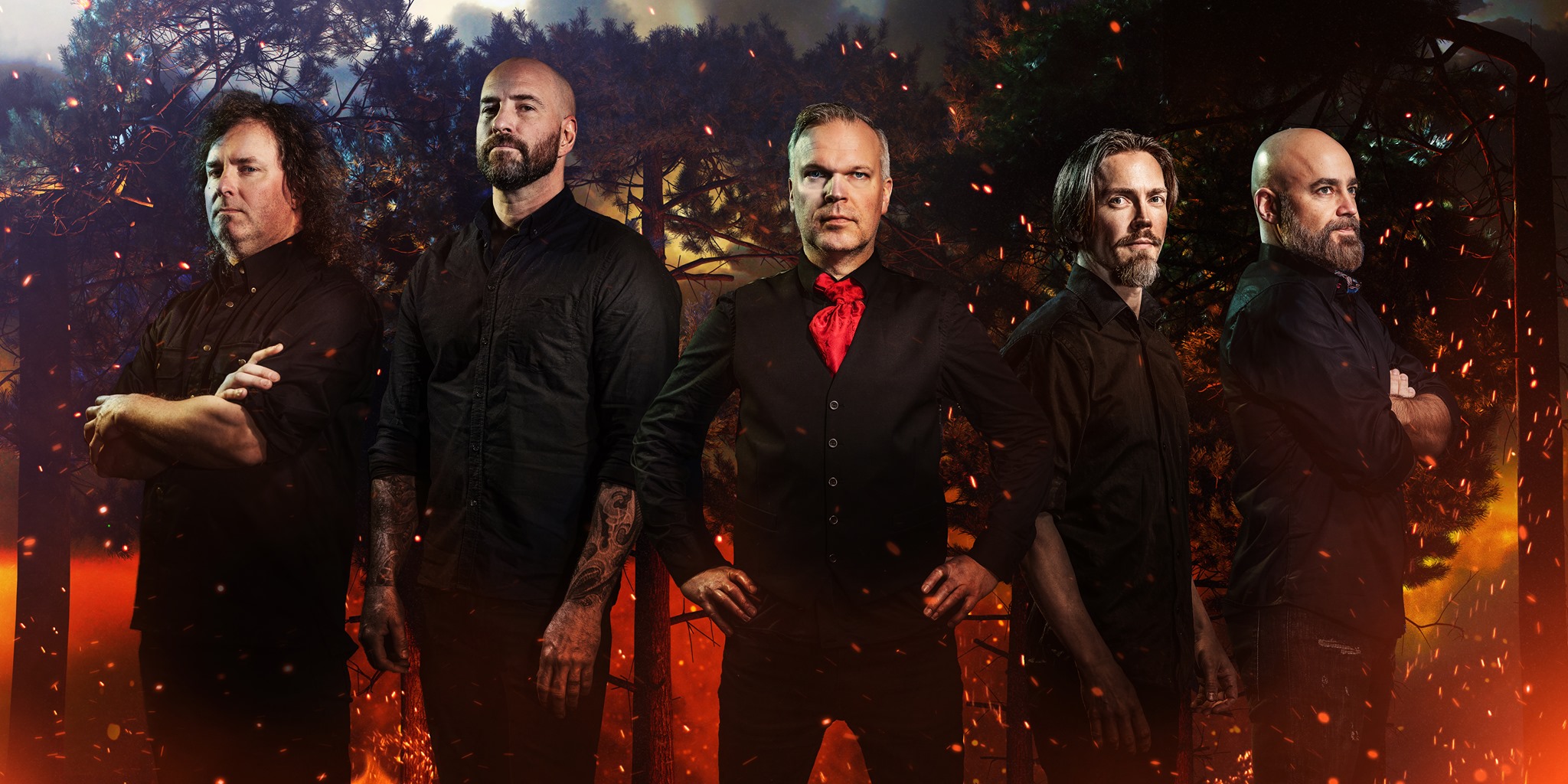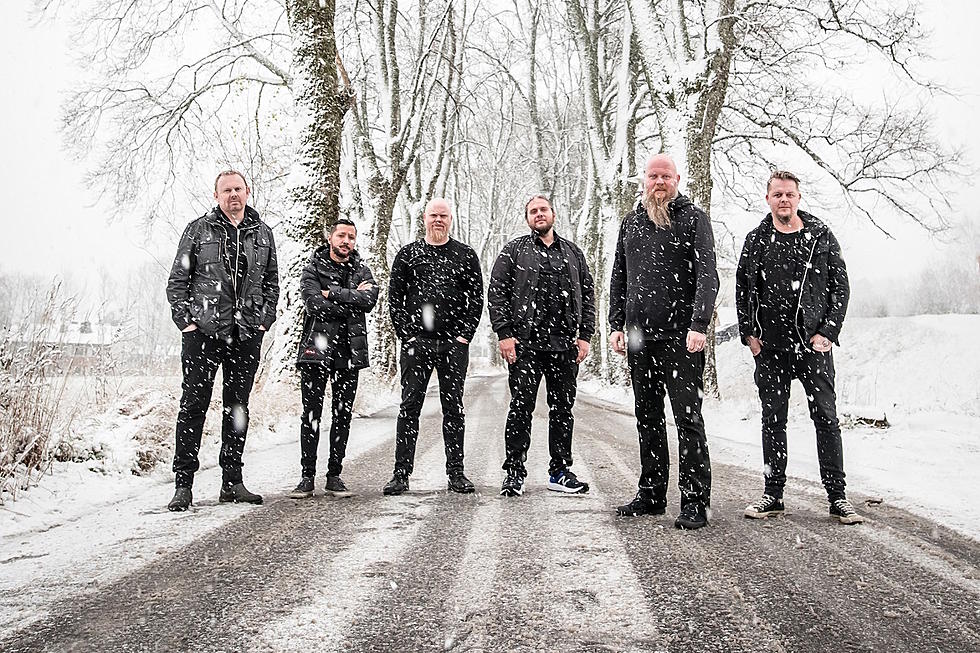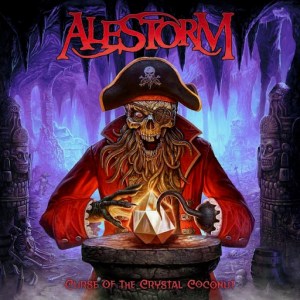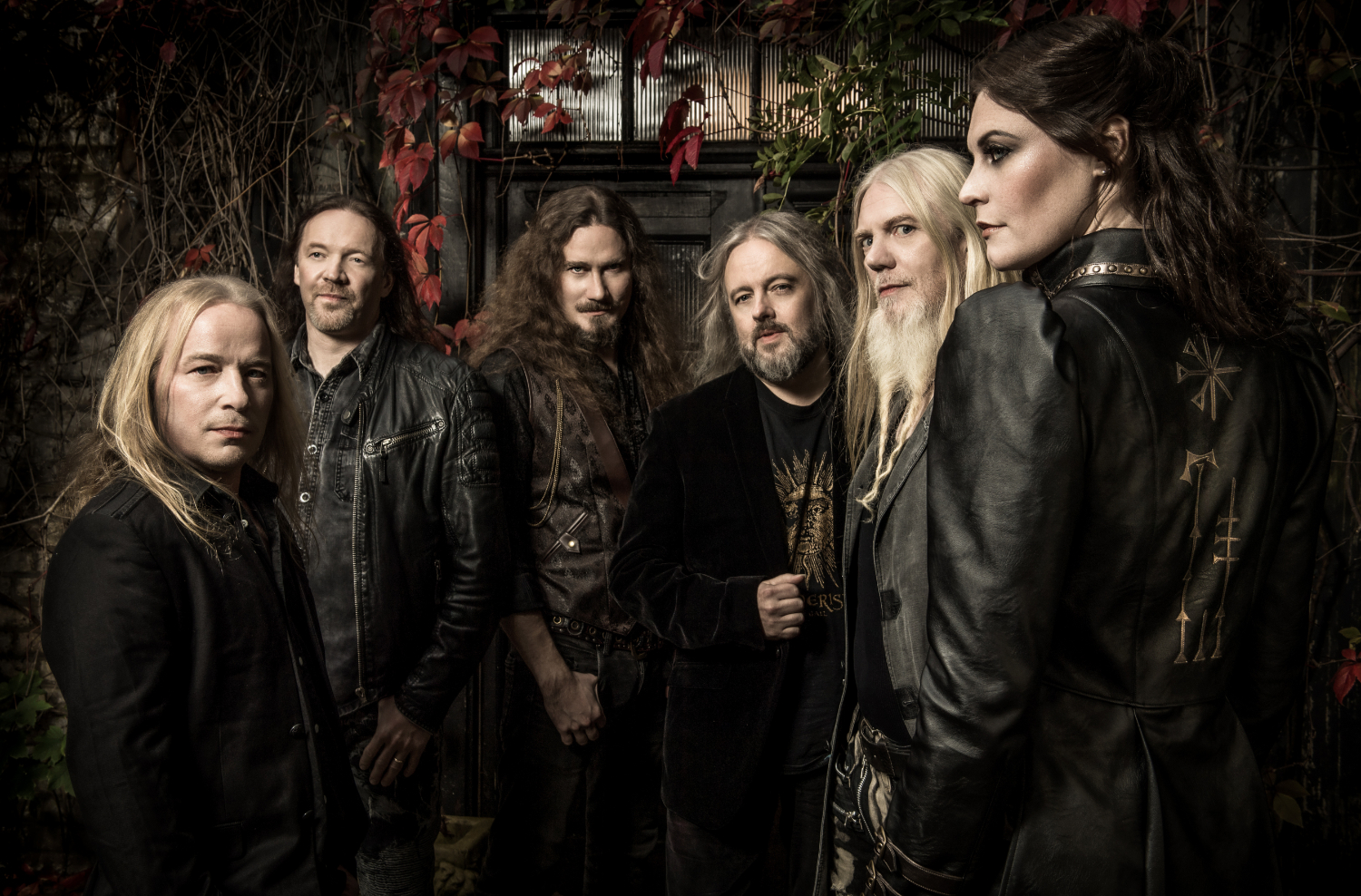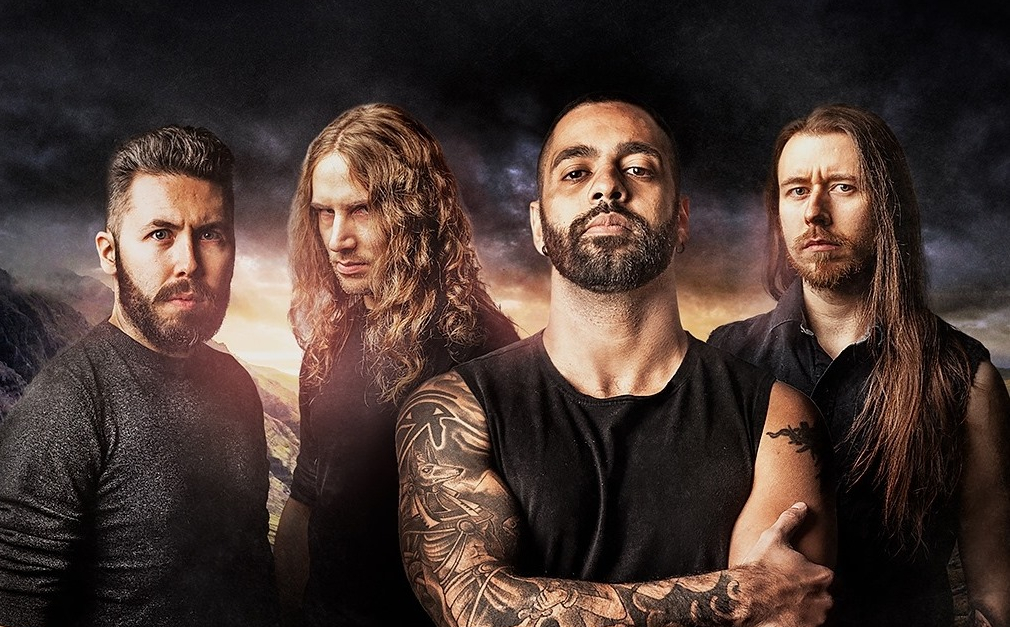Nearing the midway point of 2021, and the past few months of new music have been simultaneously surprising and disappointing in various ways. I point out some of the surprises (both good and bad) below in the many new albums I’ve reviewed here, but one of the things I’m a little frustrated about is that with a few exceptions, this year hasn’t delivered much in the way of breathtaking, truly excellent records. In response to this frustration, I’ve found myself just going back and listening to old records (went on a Judas Priest bender some days ago), also doing a little revisiting of some of the albums on my past few years best of lists (proud of myself there, they’re all still deserving of their placements), and just trying out bands I’ve never heard of before. And you know I’m not really even sure what I’m looking for genre wise, I suppose it doesn’t matter, as long as it keeps me compelled and coming back for another listen. So with that in mind, I’m an open book for any recommendations if you’ve got them, because its been a little meh lately. In other news, I bought my first concert ticket in over a year the other day, a two day pass to the April 2022 Hell’s Heroes Fest that takes place right here in Houston. I hope I’ll be seeing a show long before that one, but at least it’s a step towards normality. It never felt so good to pay for processing fees and parking passes. Right, onto the reviews:
Frozen Crown – Winterbane:

I’d been looking forward to what Frozen Crown would do next ever since I became a fan of theirs somewhere between their 2018 strong debut and it’s rather excellent Best Albums of 2019 list making follow-up Crowned In Frost which yielded the Best Songs list maker “In The Dark”. That song and other gems like “Neverending” and “Winterfall” showcased the band’s budding gifts at making melodeath-esque dense riffage soaked power metal with exuberant vocal melodies reminiscent of classic Sonata Arctica. There was a charming naivete about their approach, almost purposefully cliched in a slight way to really hammer home how satisfying this particular style of music could be, a celebration of all their influences. On their third album, Winterbane, Frozen Crown stumble slightly, and I mean ever so slightly, but it’s noticeable enough to warrant pointing it out right away considering how it stands in contrast to their first two records. This is actually a pretty enjoyable album as a casual listen, but it’s lacking a little of the wild guitar fireworks of the first two albums in favor of a more vocal melody driven direction. What I loved about the band’s debut and to a certain extent on it’s follow-up was that exciting extreme metal fusion approach that suggested shades of Jesper Stromblad mixed with Alexi Laiho.
Now the shift from being guitar centric to vocals front and center theoretically shouldn’t be a problem considering Giada Etro’s remarkably powerful and rich voice, but the vocal melodies on most of these songs suffer from a sameness that handicaps their impact. That being a plethora of boringly loooooonnnggggg notes, mainly in the form of “whooooooaaaaaaaaassss” and “ooooooooohhhhhhhhs” such as on “The Lone Stranger” (a shame because there’s some spicy guitar ear candy here that gets lost amidst the vocal drudgery). This long note extension vocal stuff pops up everywhere around the album, and the rhythmic variations we heard Etro delivering on the first two albums are hardly to be found, barring a moment here and there. One of those moments is a cover of “Nightcrawler”, and you know, its fine… it was never my favorite Priest tune by any stretch and I just think its a little too by the numbers here when they could have really dressed it with up with some power metal flair. This isn’t a knock on Etro’s talent either, as a friend in the r/PowerMetal community said of her performance on this album, “She clearly knows how to sing. Just doesn’t know how to make it interesting”. And I’m not sure if that’s on her so much as it is on guitarist/songwriter Federico Mondelli, who has noticeably lessened his co-vocal involvement in the band’s songs compared to the first two albums (he’s really only noticeable on two cuts here). And what I’ve noticed about my reaction to Winterbane is that I’m not compelled to come back to it again and again like I was with the first two records, it’s just a little tedious to listen to in various spots, and I hate having to say that.
Communic – Hiding From The World:

This is actually from 2020, but it’s one of those better late than never discoveries because Communic’s Hiding From The World is one of the best straight ahead metal albums I’ve heard in awhile. I’m admittedly not that familiar with the band, having seen their name around vaguely and maybe having checked them out in the past at some point (they’ve been around since 2005), but here they have a sound that reminds me of a less technical Nevermore. Vocalist/guitarist Oddleif Stensland has a Warrel Dane-esque tortured quality to his soulful vocals, albeit with a wider range to deliver some truly jaw dropping performances. Communic are a trio, but they manage to get a thunderous roar out of drums, bass and guitar. Stensland lays down overdubbed solos, and the way these songs are constructed — with artful passages built around contemplative shifts in tempo, dynamics, and tone, create more nuanced depth to these songs than other three piece prog/power outfits ala Rage or Grand Magus. The title track is a haunting, gradually building semi-ballad that rides Queensryche-ian guitars towards a battering ram of a riff sequence, and a nine minute track length feels more like five. Another standout is “Born Without A Heart”, a slow, pensive mood piece that reminds me of latter day November’s Doom for it’s utterly bleak mood, while Stensland crafts a vocal melody that is gorgeous yet utterly anguished. Album closer “Forgotten” seems to ride a psychedelic tinge to it’s lead guitar melodies, pairing them with dense, meaty riffs in a paean to regrets and the passage of time. Its’s a heavy track for more than just it’s sonics, and that general depressive tone is pretty much present throughout all of this album. Where Nevermore sounded angry and full of seething rage, Communic seems to explore the other emotions that result from the aftermath of those, ones more sullen and resigned.
Orden Ogan – Final Days:

I remember when Orden Ogan seemed like they were going to take over as the next massive thing in power metal. It was right after the release of To The End, which was a monstrous power metal record with two absolute bangers on it in “The Things We Believe In” and the title track, and a pretty spectacular ballad in “Take This Light”. Then the band stumbled a bit with the near-dud in Ravenhead, and something weird happened to their sound on it’s 2017 follow-up Gunmen, a simplification of a sound that was already pretty straight ahead in it’s Iron Savior meets Gamma Ray meets Blind Guardian mix. My more cynical friends at r/PowerMetal would say that Sebastian Levermann has been affected with Sabaton-itis, that affliction that where riff complexity is eschewed aside in favor of heavy synth lines and a larger reliance on easy vocal melodies. I’m on the fence of this particular debate, because I do enjoy a couple of the songs from those records, but yeah I do think the band’s sound has been a little more… streamlined as of late, and Final Days is no exception. Levermann really employs the old “don’t bore us get to the chorus” approach to his songwriting throughout, often issuing the refrain at the outset of a song so we’re jumping right in with very little buildup. It should be said, these are some very catchy songs on a surface level: “Heart Of An Android”, “In The Dawn Of The AI” and “Interstellar” have hooks that are hard to ignore. Levermann himself is as appealing a vocalist as ever, his Kai Hansen meets Hansi Kursch delivery a perfect vehicle for ultra melodic yet riff dense power metal. But there is something to the theory that Orden Ogan just isn’t as musically interesting as they used to be on their first couple albums where melody and grandeur were matched by an intensity best conveyed through a barrage of complex arrangements and riff sequences. The band has largely abandoned that more progressive side of their sound, and we’re left with these glossy, ear candy laden platters of power metal that is often a blast to listen to, but is lacking in the way of depth and emotion.
Metalite – A Virtual World:

Someone over at Metallum needs to explain how it is that Metalite has a page on their database, but Amaranthe somehow still doesn’t despite virtually identical approaches to their sound. One could even argue that Amaranthe has a greater claim to metal roots, given their harsh vocals, guitarist Olof Morck’s power metal roots in Dragonland, and Jake Lundberg’s stint in Dreamland and Dream Evil. Anyway Metalite is a curiosity in the metal world, even alongside Amaranthe, because there’s really no gimmick to be had here, except for their purely saccharine, glossy pop-metal sound. I mean it’s in the name isn’t it? Metal-(l)ite? Actually full disclosure here, I kinda like this band for just leaning into this particular sound palette and songwriting style. There’s no growls here to, I dunno, do whatever Amaranthe is trying to do with them, as vocalist Erica Ohlsson is left to her own devices to carry these songs with her straight ahead melodic vocals. I think she’s a fairly good singer judging from live clips I’ve seen, certainly good enough not to need the noticeable sheen of processing (autotune maybe?) on her vocals all throughout the album. I chalked that up to a thematic choice, it does fit with the ultra processed production wash that permeates every second of the aptly titled A Virtual World, a thematic album that as best as I can tell, is about the urge to breakaway from the all encompassing encroachment of technology (the cover art checks out). I did think it was kinda funny that I enjoyed Metalite’s “Cloud Connected” here far more than In Flames own dour song of the same name from all those years ago, at least there’s a brightness and bite to Metalite’s chorus than Anders Friden’s dishwater clean vocals. Elsewhere, “Alone” is a 80s pop starlet’s ballad set to thick power chords and has a warm charm to it, and “Beyond The Horizon” has some grand, arms wide open gesturing kitschiness that I enjoy purely for it’s surface level ear candy. I will say “Peacekeepers” and “The Vampire Song” are at best examples of not putting much thought behind your lyrics, but then again we shouldn’t expect too much here. I had fun listening to this album, which can’t be said for an armful of new releases this year.
Ghosts Of Atlantis – 3.6.2.4:

This is the debut album from United Kingdom based symphonic death metal/sometimes melodeath meets metalcore-ish Ghosts Of Atlantis. Despite being one of the more just plain awful album titles I’ve seen in a minute, 3.6.2.4. is a promising debut from a band that has the potential to turn out something spectacular down the road. These guys have an identity right out of the gate, and in that sense they remind me of Seven Spires on their debut Solveig, how there were creative ideas that pointed to great things down the road (didn’t expect them to come to fruition as quick as they did however). The most representative track here is wisely the lead off cut “The Third Pillar”, a Septic Flesh meets Therion fusion of groove based melo-death and gorgeous symphonic flourishes, including orchestral elements and a choral vocal accompaniment. Vocalist Phil Primmer is a versatile fellow, capable of some rather convincing harshes and a ICS Vortex influenced grand, theatrical clean voice that he transitions to and from rather effortlessly. Sometimes, the band tries an idea that just falls flat on it’s face and mars and otherwise fantastic song, as on “Halls Of Lemuria” where Primmer launches into a spoken word/near rap passage midway through the song that leaves me cringing. I’m sure others won’t be as bothered by it as I was, but it’s a shame because I really loved the rest of the song up to that point. When they just sharpen up their focus on tight compositions however, such as “The Curse Of Man”, they’re a potent blend of the grandeur of symphonic metal and the intimacy of melodeath. And I suppose debut albums are where these competing ideas are supposed to sit alongside each other (they can’t all be Appetite For Destruction), because Ghosts Of Atlantis at times seem to be trying out different approaches throughout the record. On “Poseidon’s Bow”, we’re treated to a little more of a progressive metal approach that reminds me of a more extreme Symphony X, while I got a strong Barren Earth vibe from “The Lost Compass”. This was a strong debut effort from a record label (Black Lion Records) that’s releasing some intriguing bands, most of whom are intermixing subgenres a bit like Ghosts of Atlantis. Looking forward to the follow up record already.
Secret Sphere – Lifeblood:

So yet another Italian power metal band that’s impressing me way more than I’d have ever expected years ago. Actually Secret Sphere isn’t entirely new to me, I first became aware of them when Michele Luppi was singing for them after his stint in Vision Divine filling in for Fabio Lione during his hiatus (actually… on second thought, I’m going to skip right past the musical chairs landscape of Italian power metallers for the time being), but now Luppi has been replaced by Sphere’s original vocalist Roberto Messina, who I remember from way back in 2003 for his stint on Alkemyst’s Meeting In The Myst (terrible band name, great record). Messina reminds me of a cross between Labyrinth’s Roberto Tiranti with a splash of Steve Perry for a more rounded, AOR style. This reunion of old band members has resulted in a spectacular collection of songs, smooth melodic metal with a slight neo-classical tinge in moments. What seems to separate Secret Sphere from their Italian contemporaries is an ear towards incorporating some subtle pop-metal influences ala Europe, something you can readily hear on “Thank You”, where punchy group vocals tackle a chorus Striker would die for. Messina shows off his flair for AOR vocal melodies with a Steve Lee-esque raspy edge on “Against All The Odds”, not only in tone, but in the mechanics of his phrasing (the sudden bend in the line “I don’t wanna say goodbye” in particular). Of course there’s plenty of more trad power metal stuff happening here too, as on the cracking title track where guitarist Aldo Lonobile spits out fireworks in the vein of Vision Divine’s more neo-classical, uptempo rockers. I also love the vibe of “The End Of An Ego” where the melodies are somewhat jagged but fit just enough to form a hook that’s satisfying in it’s raw energy and metallic edge. Like their countrymen in Labyrinth earlier this year, Secret Sphere have delivered one of the more standout power metal albums this year, and it’s always great to see veteran bands stepping up to the moment where younger bands have been delivering the goods as of late (for the most part).
Numenor – Draconian Age:

Serbia’s Numenor are one of the newer crop of trad/power metal bands to have surfaced in the past decade, releasing their debut in 2013 and delivering two more records in quick succession over the next few years. They’re a curiosity in the power metal landscape however for their more symphonic black metal roots, still heard here on their fourth album Draconian Age with the presence of grim vocalist Despot Marko Miranović. This album picks up where 2017’s Chronicles from the Realms Beyond left off, with Despot splitting lead vocal duties with clean vocalist Željko Jovanović who sings in sharp contrast with his soaring, clarion tenor. I really like Jovanović’s vocals, he’s got a nice balance of Kiske-ish lightness to his tone but undercut with a darker, weightier edge. On the eponymous “Numenor” (I guess it was bound to happen at some point, but gotta give them some credit for waiting until four albums in), Jovanović delivers his best performance to date with a layered lead vocal that is built on extended syllables and a fearless, heroic swagger befitting the lyrical subject matter. Guitarist Srđan Branković balances epic, Andre Olbrich-esque leads with some rumbling, thick riffs underneath, a mix that really gives a USPM vibe to a lot of what Numenor does. Oh speaking of Blind Guardian, Mr. Hansi Kursch makes splashy guest appearance on the lead off track “Make Your Stand (At the Gates of Erebor)”, matching his recent Judicator guest appearance with something that’s just as awesome, and perhaps even more striking for just how much he contrasts with Despot (yet fits in with Numenor’s sound like a glove). It’s bound to be the most talked about song on the album just for Hansi’s presence alone, but hopefully it doesn’t overshadow the equally spectacular “Feanor”, which behind Guardian’s own “The Curse of Fëanor” is now my second favorite song about the maker of the Silmarils to date. Something I’ve really come to appreciate about Numenor is their punchiness, with their songs kept fairly short and to the point despite their aim for epic majesty. Seriously, none of the ten songs on this album reach past the four minute mark, and most stay just above three minutes in length like some kind of pop-punk record. It keeps every listen of Draconian Age refreshingly short in an age of ten minute plus epics and unnecessary intro tracks, and more importantly it makes Numenor stand out from the crowd. The grim vocals will prevent this from being accepted by some power metal fans, and sometimes the narrations are a bit over the top, but this is easily one of the stronger records released this year.
Moonspell – Hermitage:

Ah this wasn’t an easy album to consider… I really sat with it for a long time, in fact, I believe I mentioned as much on the last two MSRcast episodes which were weeks apart even. My hopes for this record were elevated by the fact that Moonspell was one of the bands at the last gig I attended in October of 2019 (I know…) on their trek with Amorphis and Anneke Van Giersbergen. It was a spectacular show, my first time seeing them since 2005 or somewhere around then when they opened for Opeth, and Moonspell managed to steal the show yet again. I dove back into their past few records that I’d only glanced at before and got really into 1755 and Extinct. My anticipation level for Hermitage was fairly high then, and upon my first listen, I just couldn’t decipher what it was I was listening to. Gone was the aggressive, dark heavy rock inflected vibes of the past two records and in it’s place was something much more muted and atmospheric. I know I’ve written about this before, but that disconnect that happens when something you’re expecting is anything but, makes it hard for you to accept what something actually is — in other words, I had to take a break from trying to crack this album, get some distance from it and try again after a few weeks. This is a late February release, and it’s mid-May right now, and I’ll be honest I’m not even sure if I know what I’m thinking about this record sometimes. There are a couple of really cool moments here, particularly “Entitlement”, with its laid back, almost early aughts Paradise Lost vibes, but also “Common Prayers” with its Depeche Mode tones adorning a rather well done web of groove based riffs. And I appreciate the lead off track “The Greater Good” for it’s rare moment of pure aggression from vocalist Fernando Ribeiro, who for the most part hush sings his way through this album, even during it’s more emotive moments. I suspect the title track would have been a better lead single than “All Or Nothing”, which alongside “Without Rule” is a lengthy, seven minute plus track that needed to be half the length at it’s present tempo, or at least offered something in the way of shifting dynamics and sonic diversity. Those are moments where this album just loses me entirely, and they’re so sleepy, it makes it hard to recover. Maybe this is a mood dependent record, but I keep suspecting it’s just far too overthought for it’s own good.
Spectral Wound – A Diabolic Thirst:

One of 2020 musical resolutions was to try to leap back into black metal, but then the pandy happened and well, I was listening to other, more happier forms of music. I still am slow on the black metal uptake, largely because it doesn’t arrive in my promo box all that often and most of the stuff I get recommended to me is atmoblack (for godsake, no more atmoblack). I have been checking out an ever growing, largely black metal playlist made by friend of the podcast Justin who is far more on top of that genre’s new releases than I am (I think we’re calling him The Metal Detector now). But I’m proud to say one of the more notable black metal discoveries I’ve made for myself this year is Spectral Wound, and I believe they’re worth making noise over. These Montreal based guys are on their third record with A Diabolic Thirst, scoring a higher profile release this time around via Profound Lore, and they deliver some of the most convincingly frostbitten and grim second wave revivalist black metal you’ll hear this year. The most impressive aspect of this record is how this band manages to conjure up a tangible atmosphere without having to utilize keyboards, largely due to the creative guitar tapestry woven by Sean Zumbusch and Patrick McDowall who deliver razor sharp waves of tremolo riffs. On the album highlight, “Soul Destroying Black Debauchery”, they launch the song with a memorable riff that is actually this side of pretty and has a fairly expansive direction throughout. They largely operate in wall of sound territory, but part of what makes Spectral Wound’s sound so appealing is their willingness to incorporate space as a texture, particularly when one guitar drops away and it feels like you’ve made it below an awning to duck out of the deluge for a moment. You hear this on “Frigid and Spellbound”, and get to hear drummer Illusory (great black metal name btw) take advantage of the open space to knock out some creative rhythmic work and rolling fills. Gluing all this together are blistering vocals by Jonah Campbell (no grim pseudonym for him I guess) and a relatively polished production that makes the raw black metal components sound less like early Darkthrone and more like modern day Watain. I wish all modern black metal was this easy to love.

